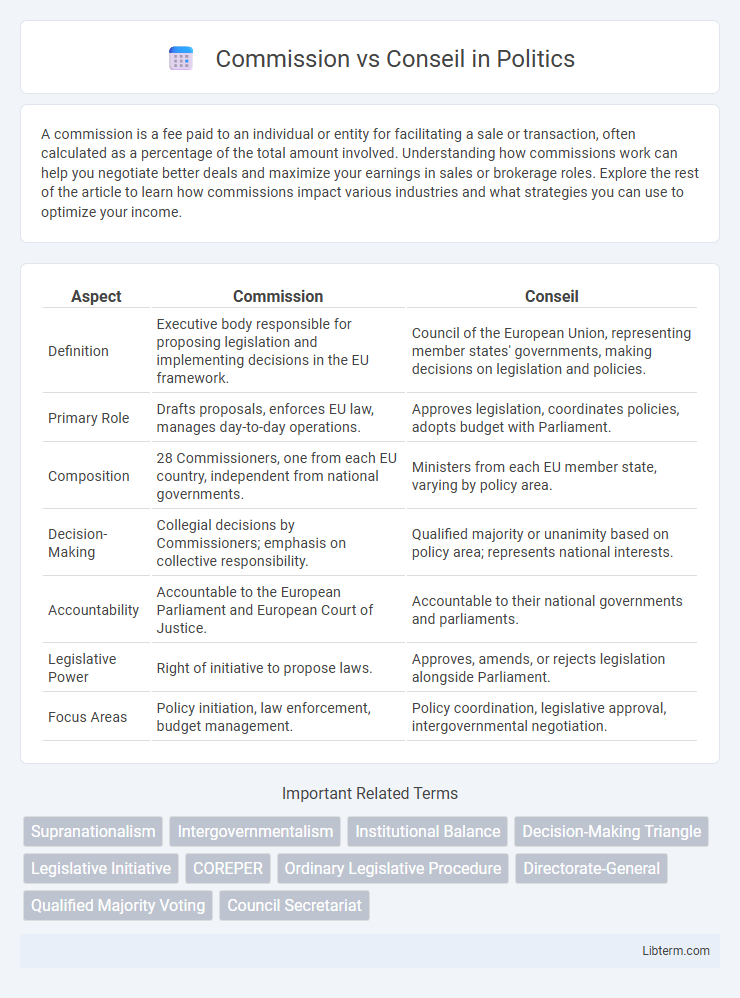A commission is a fee paid to an individual or entity for facilitating a sale or transaction, often calculated as a percentage of the total amount involved. Understanding how commissions work can help you negotiate better deals and maximize your earnings in sales or brokerage roles. Explore the rest of the article to learn how commissions impact various industries and what strategies you can use to optimize your income.
Table of Comparison
| Aspect | Commission | Conseil |
|---|---|---|
| Definition | Executive body responsible for proposing legislation and implementing decisions in the EU framework. | Council of the European Union, representing member states' governments, making decisions on legislation and policies. |
| Primary Role | Drafts proposals, enforces EU law, manages day-to-day operations. | Approves legislation, coordinates policies, adopts budget with Parliament. |
| Composition | 28 Commissioners, one from each EU country, independent from national governments. | Ministers from each EU member state, varying by policy area. |
| Decision-Making | Collegial decisions by Commissioners; emphasis on collective responsibility. | Qualified majority or unanimity based on policy area; represents national interests. |
| Accountability | Accountable to the European Parliament and European Court of Justice. | Accountable to their national governments and parliaments. |
| Legislative Power | Right of initiative to propose laws. | Approves, amends, or rejects legislation alongside Parliament. |
| Focus Areas | Policy initiation, law enforcement, budget management. | Policy coordination, legislative approval, intergovernmental negotiation. |
Introduction to Commission vs Conseil
Commission and Conseil represent distinct organizational structures within administrative and governance frameworks. A Commission typically functions as a temporary or specialized body appointed to investigate, regulate, or make decisions on specific issues, often possessing delegated authority. In contrast, a Conseil generally serves as a permanent advisory or deliberative assembly, providing guidance, policy recommendations, and oversight within institutions or government bodies.
Definition of Commission
A commission is a formal group appointed to carry out specific duties, often temporary and focused on investigation, research, or regulation within a defined scope. Unlike a conseil, which typically serves as an advisory body, a commission possesses decision-making authority or the power to enforce rules. Common examples include regulatory commissions, investigative commissions, and commissions of inquiry.
Definition of Conseil
Conseil refers to a formal advisory body or board that provides strategic guidance, policy recommendations, and expert opinions to organizations, governments, or companies. Unlike a commission, which often has investigative or regulatory authority, a conseil primarily serves as a consultative entity without executive decision-making power. This advisory role emphasizes collaboration and informed decision-making based on specialized knowledge and collective expertise.
Historical Background
The Commission and Conseil are foundational institutions in French governance, with the Conseil historically serving as a royal advisory council during the Ancien Regime, evolving into various judicial and administrative bodies over centuries. The Commission emerged later as a mechanism for regulatory oversight and administrative decision-making, gaining prominence in the 20th century, particularly within the European Union framework where the European Commission acts as the executive branch. Their distinct historical trajectories reflect the shift from monarchical counsel to modern bureaucratic governance and supranational administration.
Main Functions and Roles
A Commission primarily functions as an authoritative body responsible for regulatory oversight, policy implementation, and specific administrative tasks, often with the power to enforce laws and make binding decisions. A Conseil, or council, typically serves an advisory or deliberative role, providing expert opinions, strategic guidance, and recommendations to decision-makers or governing bodies. While Commissions execute and enforce regulations, Conseils focus on consultation, consensus-building, and shaping policies through collaborative dialogue.
Structural Differences
Commissions typically involve a group of experts appointed to perform a specific task or investigation with limited authority and duration, whereas conseils function as advisory bodies providing ongoing counsel and strategic guidance. The structural difference lies in the commission's task-oriented framework, often temporary with a defined scope, compared to the conseil's continuous role within an organization or government, characterized by a broader mandate and regular meetings. These distinctions impact decision-making processes, with commissions focusing on report generation and conseils influencing policy through sustained deliberation.
Decision-Making Processes
The Commission operates as the executive branch in decision-making, responsible for proposing legislation and implementing policies within the European Union framework. The Conseil, or Council of the European Union, functions primarily as a legislative body, collaborating with the European Parliament to adopt and amend proposals. Decision-making processes involve the Commission initiating proposals, followed by negotiations and approvals within the Council, emphasizing intergovernmental consensus and member state interests.
Influence on Policy and Governance
Commissions often serve as specialized bodies with specific mandates, providing expert recommendations that directly influence policy formulation and legislative decisions. In contrast, councils tend to offer broader advisory roles, facilitating stakeholder engagement and consensus-building that shape governance frameworks indirectly. Both entities play critical roles in policy development, with commissions driving targeted action and councils promoting inclusive deliberation.
Advantages and Disadvantages
Commission structures offer clear performance incentives by linking pay directly to sales or results, motivating increased effort and productivity; however, they can lead to income variability and potential short-term focus. Conseil models provide stable, predictable compensation, fostering long-term relationship building and strategic thinking, but may lack the strong motivation that commissions stimulate. Balancing commission and conseil approaches can optimize motivation while ensuring financial security and sustainable business growth.
Conclusion and Key Takeaways
Commissions typically function as temporary, task-specific bodies designed to investigate or address particular issues, while conseils operate as permanent advisory or decision-making entities within organizations. The key takeaway is that commissions provide focused expertise and recommendations on defined mandates, whereas conseils maintain ongoing governance, strategic oversight, and policy formulation. Understanding their distinct roles enhances organizational efficiency by leveraging commissions for specialized analysis and conseils for continuous leadership and guidance.
Commission Infographic

 libterm.com
libterm.com